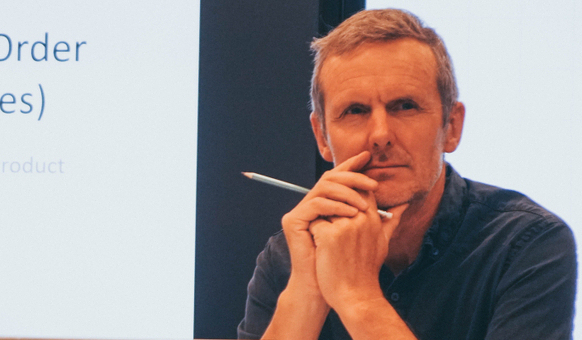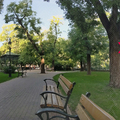 Martin Stokes is a legend - one of the best-known musicologists. He will be one of the main lecturers of the ‘Music as Heritage - from Tradition to Product’ online musicology course at CEU Summer School in July - along with András Lelkes and Balázs Weyer, directors of Hangvető. Last year at the same summer course he gave amazing lectures about topics like music and the global order or the hybridization in traditional music. We “engaged in the most casual yet learning conversations with him on different topics: from the diversity of Sufism to Britain's fading dominance in Cricket”*. We talked with him online from the quarantine about his current digital field research and many more.
Martin Stokes is a legend - one of the best-known musicologists. He will be one of the main lecturers of the ‘Music as Heritage - from Tradition to Product’ online musicology course at CEU Summer School in July - along with András Lelkes and Balázs Weyer, directors of Hangvető. Last year at the same summer course he gave amazing lectures about topics like music and the global order or the hybridization in traditional music. We “engaged in the most casual yet learning conversations with him on different topics: from the diversity of Sufism to Britain's fading dominance in Cricket”*. We talked with him online from the quarantine about his current digital field research and many more.
How are you? How do you spend the quarantine?
I returned from Istanbul on pretty much the last flight back to the UK before planes were grounded. Fortunately, I came back with a lot of material to work through. Never before have my fieldwork notes and recordings been so neatly and so quickly ordered, stored and arranged! Quarantine measures are still in place here in London, which is where I've spent the last two and a half months, working away on my current research project as well as dealing with the challenges of everyday life, as all of us have. But I am very well, thank you.
In this (post)pandemic times digitalisation and online distribution became the most important steps in order to ensure the continuity of culture. People listen to music much more online now - is it a useful transformation in the aspect of distributing music heritage?
I think this transformation was well underway beforehand. In a way, yes: it has put a very, very powerful tool directly in the hand of collectors, archivists, researchers. In a way, no, because music industries are in turmoil, musicians struggle to make a living, and everybody is drowning in information and choice. The powers and processes that control this information and choice are not obvious or mystified by the language of so-called Big Data, 'algorithmic society' and so forth. We are living through a very big transformation, with deep roots, going back significantly before digitisation, I would say.
Digital conversion can also ensure the preservation of old recordings and music heritage as is the case in your current research project on the Euphrates and its music. Tell us more about it, please.
The world I am researching at the moment is digitally sophisticated and involves state actors as well as many other agencies. The question of 'preservation' in this part of the world is a genuinely fascinating one, since the wider angle takes us back to the Sumerians and Babylonians, at least. Go to the city museum in Sanlıurfa, on the Syrian-Turkish border, and you'll find the Epic of Gilgamesh, for instance, from the 18th century BC, or to the nearby Göbeklitepe temple complex (10th millennium BC). These preserve soundscapes, in remarkable and complex ways, but ways that completely warp conventional frameworks for thinking about 'heritage', or, indeed, 'the past'. As, too, do questions about the more recent past - landscapes transformed in one way or another by violence. Digital practices need to be read against this challenging background.
The online musicology course at CEU Summer University offers a contemporary and viable approach to responsible heritage management. For whom do you recommend taking this Music as Heritage course?
I think this will be of great interest to anybody either embarked on doctoral study already or for those just about to take that step and considering options and approaches.
What do you plan to teach in this course?
I will be talking about my current project, touched on above, as well as more generally about music in Turkey, which has occupied me for a long time. It is a rich context for thinking about the Balkans, and of course, it makes a lot of sense to think through these regional connections in musical terms. We learn a lot of things, from this angle, about the music, and about the region, and about how to think through these connections.
Apply now for the course here! Deadline: 15 June -> https://summeruniversity.ceu.edu/music-as-heritage-2020
One week of online summer school with prestigious professors and amazing projects! The course presents a contemporary and viable approach to responsible arts management - audience-focused music heritage management and socially conscious business policies. The course is co-organized by Forum for Folk Art Fund, Music Hungary, and the Cultural Heritage Studies Program, CEU, Budapest, Hungary.
About Martin Stokes
He is King Edward Professor of Music at King's College, London. He studied first music, then social anthropology at Oxford. He taught among others at The Queen's University of Belfast, The University of Chicago and Oxford University, gave lectures at the University of California, Berkeley and Bogazici University in Istanbul, and currently holds an honorary professorship in the Department of Arts and Cultural Studies at the University of Copenhagen.
*Some feedback from the students about Martin:
“My favourite teacher. As much as I enjoyed his wonderfully presented lectures, I engaged in the most casual yet learning conversations on topics that always intrigued me; from the diversity of Sufism to Britain's fading dominance in Cricket.”
“Martin's approach has changed the way I view not only certain concepts within musicology but also the way I view my own music. He is a very diligent, scrupulous, patient and discerning teacher. I wish to take another course from him someday.”





